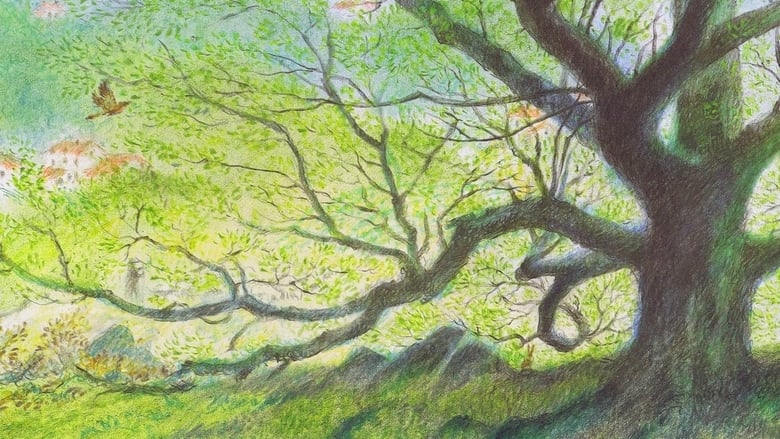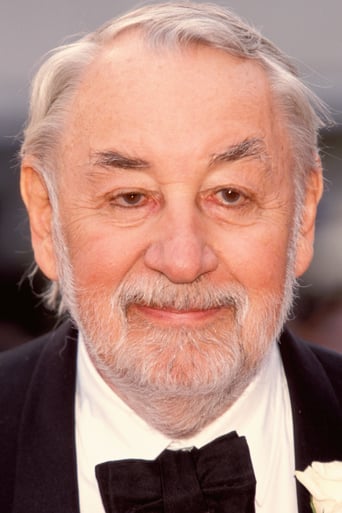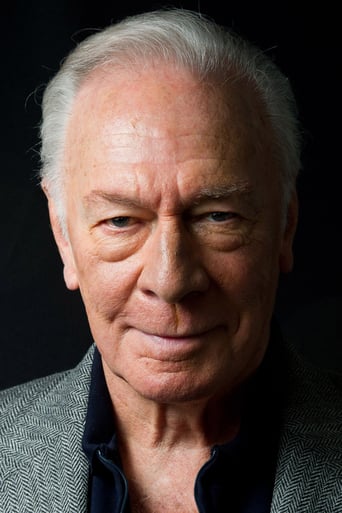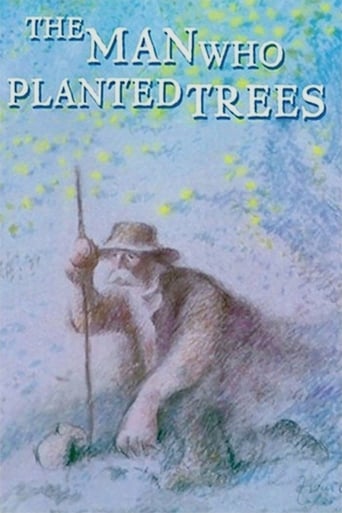
The story of one shepherd's single-handed quest to re-forest a desolate valley in the foothills of the French Alps throughout the first half of the 20th century.
Similar titles
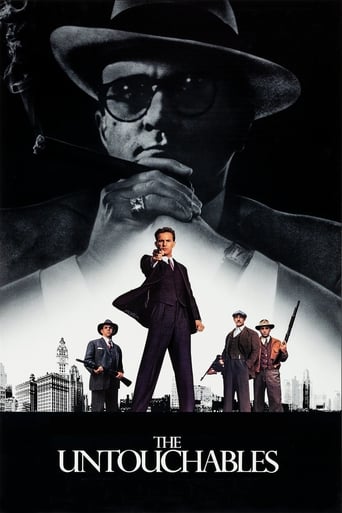


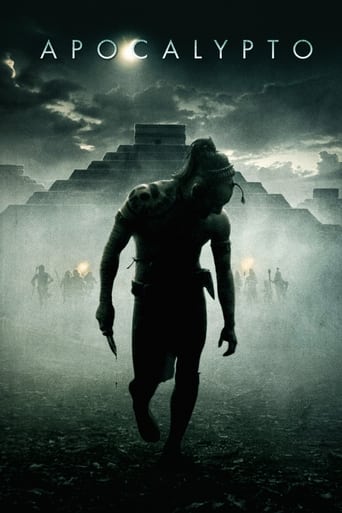
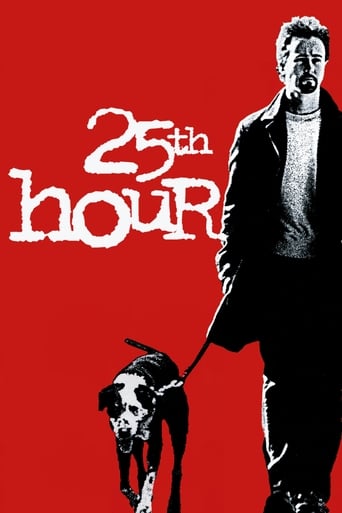
Reviews
Save your money for something good and enjoyable
hyped garbage
It's an amazing and heartbreaking story.
The plot isn't so bad, but the pace of storytelling is too slow which makes people bored. Certain moments are so obvious and unnecessary for the main plot. I would've fast-forwarded those moments if it was an online streaming. The ending looks like implying a sequel, not sure if this movie will get one
Honestly I could not remember the name of this film, yet I have been recommending it to many people over the years. Knowing over these years that it received the Oscar I was confident people would be able to find it once they knew the simple beauty of the story and the passion of this profoundly touched film lover. Funny.... I always started telling about this film with.... its about this one guy who plants trees while he is goes about his life as a Shepard in the hills..... What a beautiful testament to human spirit and the blessings of nature.
I excessively quote about Leo Tolstoy and his works nowadays in whatever I write since I'm on the verge of finishing his masterpiece 'War and Peace'. The reason for this is the universal truths that are constantly invoked in the book through the events in the lives of its characters. In one of the paragraphs, Tolstoy describes a real life character Dokhturov as 'a person who was considered inferior to others and quite neglected while quoting history but stood valiantly in the thickest of battles and the trickiest of situations without consideration for his own life. Such people were forgotten soon because people usually do not notice the most consistent and essential people but the ones who have stood because of some reasons. People such as Dokhturov are like the cog wheels in machines that quietly spin and run the entire system but most tyros who see the machines functioning oddly will foolishly assume a tiny visible chip to be the most significant part.'Elzéard Bouffier is such a character; he is least perturbed by the World Wars and any other political situation happening around him. His only ethos is to serve Mother Nature that has provided him his fundamental needs – food, water, shelter, clothing and most importantly, life. He tends sheep, raises bees and plants trees everyday; he does not blow his own trumpets, he doesn't want fame, glory and recognition, all he wishes to do is to serve nature and humanity. Like the cog wheel he does his work brilliantly, but remains unnoticed, unrecognized and he wants it that way. And indeed we the audience do not hear Elzéard speaking but are introduced to him by a nameless narrator who dedicates the entire short to the former. How ironic is it that while Elzéard remains nameless in his world, we the audience know his name and not the narrator's!The story begins with a hazy view of the sky and birds and then closes in on nebulous clumps of brown that represent hills and valleys. Our young narrator then begins reciting his journey – he wanders lonely in the hills with no water and not much hope to live. Shapes begin forming at a distance and we realize there is a small town ahead albeit a decrepit one who's church remains undamaged but deserted. He vainly searches for water in the town and leaves the place soon. His eyes are caught by the sight of a tall object in the distance which he assumes to be a tree stump but later realizes it's a shepherd with a stick in his hand. The kind shepherd offers him water and takes him along to his home; the narrator observes that though the man is extremely quiet, his eyes seem to show keen discernment and determination. At the shepherd's abode, the narrator is offered soup and later the two of them sit at the table where the shepherd, Elzéard Bouffier begins segregating seeds of acorns on the basis of their quality. The narrator offers help, but Bouffier doesn't need it as he knows only he has the eyes for such a task. He selects the best hundred acorns and puts him in his tiny bag. The inquisitive narrator is so intrigued by the man he makes an excuse not to leave the next day only to know more about Bouffier. He finds out that the man is on a mission to plant trees wherever the soil is favorable and has already planted a hundred thousand seeds in the last three years. The writer then meets him after the First World War to see that entire area is burgeoning with growing trees and young streams. His unique relationship with this altruist, environmentalist and visionary continues throughout their lives and we blessed viewers get to be a part of it.Frederic Back's works give us a feeling as if we are in a dream, however, we aren't just in any dream but one that we shall remember for a long time. This style suits short stories that are generally transient in nature- people generally don't phase out short stories as they do while writing novels; shorts come spontaneously and produce the best result when they are still fresh in mind. This artistic form wouldn't suit full length Pixar films but they create a magical effect here. Notice the scene where we see the narrator holding a bowl in his hand in the right part of the frame, and a hand and vessel magically appear on the left side to serve the writer his soup. Or the transition where the wall in Bouffier's house transforms into his cloak in the next scene. Or the herd of sheep becoming warring soldiers in the subsequent scene. Or the distorted scene that depicts the plight of the villagers. Every single frame comes alive with the use of wax pencils on frosted cel – a translucent material that is superimposed on a basic frame in order to give depth to an image. Since much of the work is hand drawn, the director has a lot more freedom to dabble with his work and provide that storytelling feel. And how can we forget the terrific use of sound that enchants us right from the beginning as we hear the clear music in the background and the audible footsteps of our narrator to the later portion where nature and human sounds dominate the picture?My university had organized an Environment Awareness event recently where I was in the management team. Almost the entire event was marked with amateur performances, skits and poems, and in the end, I was shocked that the most important part of planting seeds was subordinated to a feeble ten minutes where we actually had to scatter the seeds that were placed inside balls of mud! Is this true compassion towards nature? Of course not. True passion comes from those people who like tiny cog wheels that operate actively but invisibly.
Frédéric Back's 'The Man Who Planted Trees (1987)' is the one short film that has been fervently recommended to me above all others, and I'm surprised that it took me so very long to get around to it {fortunately, my stubbornness proved beneficial, since I was able to hold out for a high-quality copy}. My only previous experience with Back was his first Oscar-nominated effort 'All Nothing (1980)' in May 2007, and I enjoyed its artistry, even if the basis in Creationism kept me distanced from its central themes. This effort, arguably Back's most celebrated, tells the story of Elezeard Bouffier, an old shepherd who singlehandedly created a forest through decades of planting seeds. Though I initially assumed that Bouffier was a real-life figure, he was, in fact, a fictional creation of author Jean Giono, who apparently perpetuated the misconception. Either way, this shepherd's story is powerful and inspirational, Back's animation giving life to Giono's uplifting tale.When I recall Frédéric Back's work, the first contemporary animator who comes to mind is Aleksandr Petrov, whose paint-on-glass animation allows similar dream-like visuals that morph from one image to another like a shifting desert landscape. 'The Man Who Planted Trees' doesn't resemble a moving oil painting, as does Petrov's work, but instead bears a slightly more minimalistic pastel-sketching style. Even so, the attention-to-detail is simply staggering. For the film's opening half, the colour palette is largely sepia-toned, emphasising the sheer barrenness of the desert, with bare rocks and coarse weeds lashed by a dry, bitter wind. As Bouffier plants his trees, Back gradually introduces colour into his work, symbolising the physical and spiritual rebirth of the region. My single slight criticism with the film is that the narration should probably have been used more sparingly. As warm as I found Christopher Plummer's voice, I think that some scenes would have proved more powerful had the viewer been left to his own accord, to absorb for himself the breathtaking beauty of Back's animation.'The Man Who Planted Trees' serves, I think, as a fine counterpoint to Back's previous short film, 'All Nothing.' In the latter, a dissatisfied Mankind rapes and pillages the life that his Creator has placed upon the planet. In this film, Mankind gives back to nature; rather than destroying life, Bouffier creates it himself, even as two World Wars rage overhead. On at least two occasions, the narrator {Christopher Plummer in the English-language version, Philippe Noiret in the French} remarks that what Bouffier accomplished makes him something akin to God. Indeed, the government officials who arrive to observe his forest can think of no other explanation for the miraculous rebirth, declaring it an astonishing natural phenomenon. Nobody can believe that all this joy could have been created by the hand of a single man. I interpreted this as a touchingly humanist statement. After all, if an old shepherd like Elezeard Bouffier can give rise to such life, why, indeed, do we need a God at all?
Animation changed greatly after the major studios (Warner Brothers, Disney, MGM, etc.) stopped producing their own animated works. This 30 minute short is one of the best of the period since the major studios regularly produced animated shorts based on cels.This 30 minute, Oscar-winning production of the Canadian Broadcasting Corporation is an animated portrayal of a French "Johnny Appleseed", who did his work among the turmoil of World War I. Both men, Johnny Appleseed and Elzear Bouffier, the subject of this film, were real men who appreciated the importance of trees on the land. This film is not widely available. Videotapes can be ordered from Direct Cinema in Harriman, New York.
Top Streaming Movies











